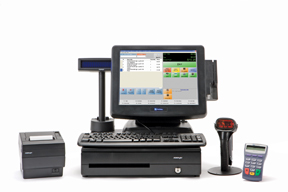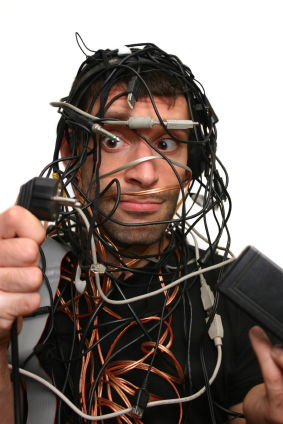October 27th, 2010 by Jamie Estep
What a POS!
Filed in: Credit Card Equipment, Merchant Accounts | 2 comments
Small retail businesses and restaurants are often faced with a tough decision when it comes to their method of customer checkout and the processing of customer credit cards. There are essentially 2 methods that can be used to ring up, and accept payments from customers. The first is the traditional cash register and credit card terminal, and the second is the all-in-one point-of-sale (POS) system. Many times a business owner will jump toward either side without fully understanding their business and their unique requirements.
Why use a POS system?
 POS systems can greatly increase a business’s operational efficiency. They allow fast checkout at the counter, and can be used to manage inventory, priced, sales, and everything else a retail business would need with respect to the checkout process. Many of the more advanced models can integrate with a database that also controls an ecommerce website for unified inventory and ordering control. They can be self contained units, with an attached credit card reader and printer, which can make for a much cleaner and more organized counter-top. For restaurants, a POS system holds the entire menu, and often uses a fast touch-screen interface. This can reduce wait staff / kitchen errors, add and calculate gratuity, and make the entire payment process significantly smoother. POS systems can save lost sales and handle sales better than the fastest cash register operator. POS systems can truly alter the speed and efficiency that a business operates.
POS systems can greatly increase a business’s operational efficiency. They allow fast checkout at the counter, and can be used to manage inventory, priced, sales, and everything else a retail business would need with respect to the checkout process. Many of the more advanced models can integrate with a database that also controls an ecommerce website for unified inventory and ordering control. They can be self contained units, with an attached credit card reader and printer, which can make for a much cleaner and more organized counter-top. For restaurants, a POS system holds the entire menu, and often uses a fast touch-screen interface. This can reduce wait staff / kitchen errors, add and calculate gratuity, and make the entire payment process significantly smoother. POS systems can save lost sales and handle sales better than the fastest cash register operator. POS systems can truly alter the speed and efficiency that a business operates.
Why not use a POS system?
The point of this article is not to discredit POS systems, as they are absolutely essential for many retail businesses. It is rather to get business owners to look at every aspect of the system before making their decision. This will hopefully relieve some of the upgrade and support shock that is commonly experienced with POS systems down the road.
Cost, cost, cost…
The increased convenience that comes with a POS system often comes at a very high price. Not to say this price is never offset by increased sales and customer satisfaction, but there are real costs in purchasing and owning a POS system. First, there’s the actual monetary price to purchase or lease a POS system which is can be very high, up to $5000 per checkout lane in some cases. There’s often additional fees for each transaction you process because the POS system has to use special connections with processing networks. There’s the cost of programming and maintaining the POS system. The initial setup is usually done by a supporting company that comes on-site to install the system. However, just like a computer network, there must be someone on-staff or on-call or on-contract that can manage the POS system. Managing a POS would include making changes to prices, adding inventory, training, etc., but also includes managing the system in case of errors, power failure, hardware failures, and every other failure scenario a computer, credit card terminal and computer network might run into. If the business owner or manager is not technically-savvy, which is commonplace, it means hiring a person or company to manage the system.
Whether you are going to do it yourself, hire a dedicated employee, or hire a support company to manage and maintain your system, make sure you understand the potential costs and the potential pitfalls of every method.
Upgrades
 The upgrades that POS systems require are not always free or even cheap. When you purchase a POS system, it usually comes with a support contract. Depending on the support contract, it may include updates for the life of the POS system, or it may not include major updates, or may not include updates past a certain time period, or may not include any updates at all. It may not include adding new peripherals to the system. You need to add a second bar code scanner? $500 please!
The upgrades that POS systems require are not always free or even cheap. When you purchase a POS system, it usually comes with a support contract. Depending on the support contract, it may include updates for the life of the POS system, or it may not include major updates, or may not include updates past a certain time period, or may not include any updates at all. It may not include adding new peripherals to the system. You need to add a second bar code scanner? $500 please!
When security regulations change, or when a bug or flaw in the system is discovered and the whole application needs an overhaul, you may end up shelling out a few thousand dollars per lane for upgrades that you have no choice in installing! If you decide to change credit card processors, I’ve seen multi-thousand dollar fees just to update the system with the new credit card processors information.
The point is, POS systems have costs that go well beyond the initial purchase of the system. Make sure you understand all setup costs, upgrade terms and costs, adding or changing peripherals, adding or changing credit card processors, and any other recurring or unanticipated fees that might be required in the future.
Security
PCI-DSS is a constantly evolving guideline for security, and POS systems are often at the sharp end of the regulations. When business owners purchase a POS system, they often assume that the provider is responsible for the security of the system. What we have found in the past 2 years is that this is often not the case, or at least not entirely the case. Even if you have no idea how to manage a POS system, let alone make sure it is secure, you may be responsible and fully liable in the event that someone steals data from your company. Security should be the #1 factor in your decision to purchase a POS system, even before making sure it has all of the features that you need. Neither consumers nor card issuers give a pass for ignorance. Do your homework and make sure that the system is secure now (and PCI compliant) and will be secure, or at least able to upgrade as security policies change, over the next 10 years. Also make sure you understand whom is responsible for the security of the system, most likely it will be you.
Proprietary
Some of the POS systems out there have requirements to process with them or with a certain company. While this can work for some businesses, I am always against merchants being tied down to any single provider. If you’re using a proprietary POS system, and your credit card processor is terrible or is ripping you off, it doesn’t matter. You’ve already made the huge investment in money, time, and training, and you’re not going anywhere. The POS provider and the credit card processor know this as well. If you use a product or service that has effectively eliminated competition due to contractual obligations and / or proprietary equipment, expect them to act that way!
Overkill
The final reason not to use a POS system, is that is it simply overkill for many businesses. Because the price for a POS system requires a great deal of thought and money for a business owner, it’s not common that I see businesses with a POS system that don’t need one, but it does happen. For very small retail and restaurants, a cash register and credit card terminal are often completely sufficient, and can save the business owner thousands of dollars and hours of headaches. Only you can decide this, but don’t chose a multi-thousand dollar POS system just because you think you need it. Don’t chose a credit card terminal just because you think you’ll never need a POS.
These are things that should be well understood before deciding on any method for checkout and payment processing. POS systems are one of the best ways to help a retail business, but if not understood or poorly planned, they can be the biggest money drain you ever experience.
Finally, always have a backup!
No matter what method you choose for your business, make sure you have a backup method of checking out customers and accepting payments. This could mean a calculator and a low cost credit card terminal for some, or just a manual imprinter for others. An outage of your POS system shouldn’t compromise your business.





Thanks for telling about POS in detail. Nice work
Good information. I especially agree with the last section concerning backups. I don’t think many POS system manufacturers stress this enough.
On the price issue, in my opinion, $5000 per checkout lane is a high price. You can find a quality used POS system with all hardware included for a much cheaper price.